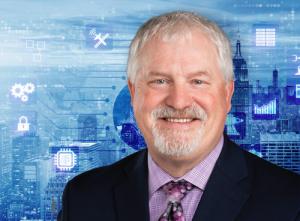Schneider Electric
Jeff Morris is Director, State Government Relations at Schneider Electric North America, and a former Washington State Representative.
For this panel, we have two association executives, two policymakers, and a leader at a DOE National Laboratory All have long histories in the energy sector and national perspectives. Our objectives were to elicit potentially competing perspectives on what the future of the electric industry may be, and for those responses to stimulate readers to develop their own perspectives and initiate similar discussions within their own organizations.

PUF: In the next five to ten years, what technological advancement will most impact the electric industry? Why? How?
Jeff Morris: Machine learning. As machine learning advances so will the advent of the bottom up electric grid.
The ability to use the data of patterns in buildings, to use the ambient air and water as a storage medium to work in unison with the grid, predict mobile electric demand, like electric vehicles, coming and going from behind the meter, communicate with the distribution system operator uptake rates based on customer values.
The most efficient electrical and economic transaction is where supply and demand meet at the closest proximity, and machine learning will enable that. Either cost or other values like a decarbonization by customers can be planned and predicted versus the organic, reactive, and expensive way we plan our electric grid today.
PUF: During the pandemic, many people worked from home. Will this be a trend in the industry? If, yes, what are its implications?
Jeff Morris: Yes. One of the lessons from the great recession was with automation many businesses did not need the size of work force they previously carried. The profitable but jobless recovery demonstrated that.
The lesson of this non-economic recession will be we didn't need all that building space. The telecommuting work force uses less energy, is less carbon intense, and has less risk to liability.
We will also see less pressure to build more and more commute infrastructure, which will reduce transportation taxes and allow more resources on what infrastructure we will need like backhaul fiber, better air handling in human congestion points, and telemedicine.
PUF: What will determine the future of renewable energy - Economics? Public opinion? Regulatory environment? Technological advances? Transmission development? Other?
Jeff Morris: A colleague wrote a blog about the movie, Current Wars, pointing out we are seeing the devolution of Westinghouse to the model envisioned by Edison before our eyes today.
I agree.
Only a handful of utility CEOs are seeing the demise of hardware as a revenue source and the onset of software and transactions as the new business model. The future of renewables is in price, location, and time.
Many customers today are looking at their electric bills and seeing that the cost of electricity is a very small percentage of their electric bills. Why should I pay for electricity that costs me more if I provide it myself?
The grid defection rate in Hawaii, TV shows on the ease of building off the grid, and savvy utilities offering their own disconnected product or rates and pilots based on a sharing economy are showing the future of renewable energy.
PUF: Will the pandemic's impact lead to more distributed generation and/or better utility-customer and customer-customer interactions? If yes, how?
Jeff Morris: This is a tipping point. Utilities with their head in the sand start to push more hardware out to substations that serve residential load.
This will result in increased rates and more separation in the cost spread to self-generate, store, and manage my own electrification. Many microgrid owners are seeing the only benefit to connect to the grid is that if they get paid for providing benefits.
Utilities that have digitized their distribution system, in particular their circuits, are seeing a larger value in the relationship between themselves and customers on the circuit level. Less dense utilities are seeing they need to offer their own disconnected DERs or lose customers.
PUF: The current federal Administration has relaxed regulatory and environmental rules regarding fossil fuel emissions. Will electric utilities change their strategic and operational plans in response? Please explain.
Jeff Morris: No. The last administration tightened rules and when they were changed utilities didn't change their plans because customers, not government, were telling them what they wanted.
Our Panel of Veteran Leaders on Electric Trends:
- Paula Glover, CEO, American Association of Blacks in Energy
- Pat Wood, Former chair of the Federal Energy Regulatory Commission and Public Utility Commission of Texas
- Miles Keogh, Executive director, National Association of Clean Air Agencies (and former director of the NARUC Research Lab)
- Ron Melton, of Pacific Northwest National Laboratory
- Jeff Morris, of Schneider Electric (former Washington State Representative)


